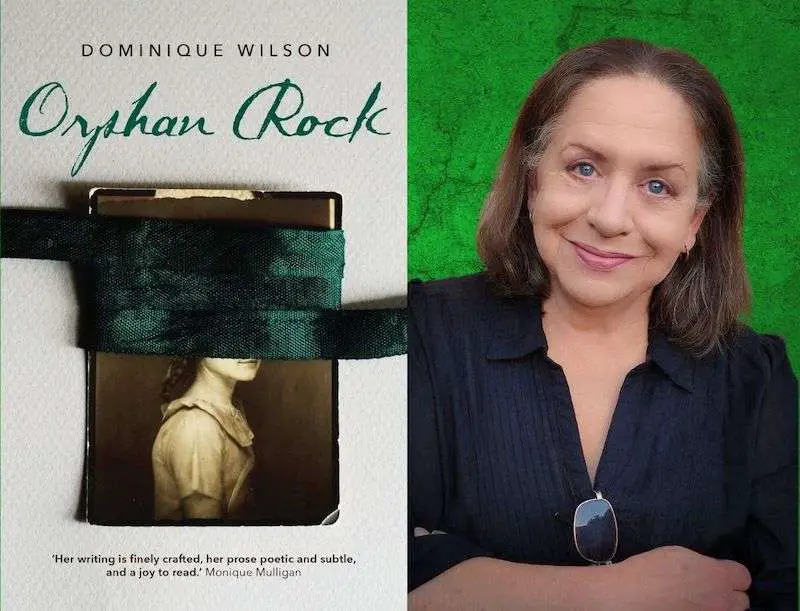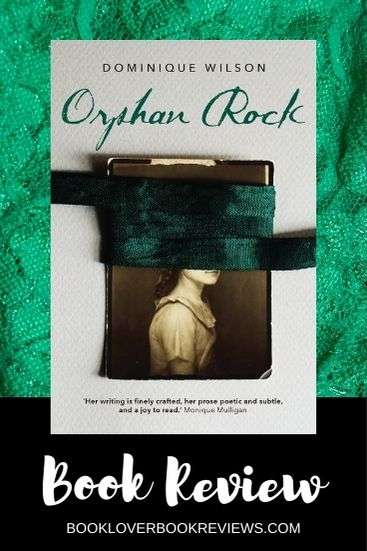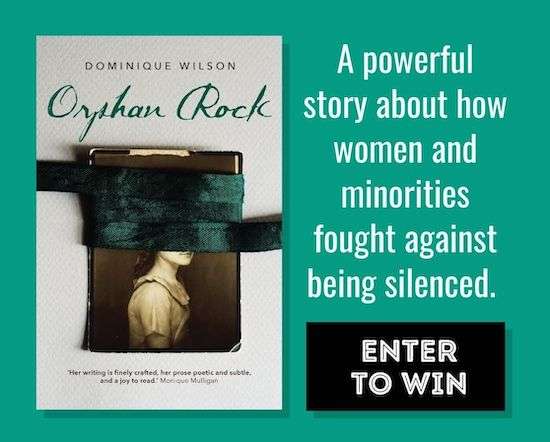Orphan Rock: Dominique Wilson’s inspiration + Book Review + #Giveaway
We welcome author Dominique Wilson to discuss the inspiration behind her new historical novel Orphan Rock, I share my review, plus thanks to Transit Lounge Publishing two lucky AU/NZ readers will win a paperback copy.

Disclosure: If you click a link in this post and make a purchase, I may earn a small commission.
Dominique Wilson on the inspiration for Orphan Rock
The idea for Orphan Rock came about because of a casual comment made by Barry Scott (my publisher at Transit Lounge). My previous novel, That Devil’s Madness (about the Algerian War of Independence, set mostly in North Africa) had just been released, and I had written about a quarter of a new novel, set in Sierra Leone, when Barry said he thought it would be good if my next novel was set mostly in Australia. It made me pause and consider that option.
I was, at the time, reading the biography of Louisa Lawson (Henry Lawson’s mother), and I really liked the way she had gone against the norms of the time, hiring only women for her press, and the clever way she had managed to overcome the Typographical Association of New South Wales’s attempt to impose a boycott on her journal, The Dawn, by using the excuse that such work was detrimental to women’s health. So I started researching the history of Australia around the late 1800s onwards, and of Sydney in particular.
“It’s an era that’s really interesting because so much is happening, not only in Australia but also around the world.”
~
What I found was that Sydney was filled with interesting characters – you have Louisa and others starting to demand equal rights for women, you have Quong Tart, a Chinese man who spoke English with a Scottish accent and loved to quote Robert Burns, and who becomes one of Sydney’s most loved and respected characters amongst all classes, right in the middle of a time when workers were agitating against Chinese labour and the White Australia Policy was being drawn up. Then move forward a few years and you have Tilley Devine and Kate Lee and their razor-gangs, warring over their territories.
But it wasn’t only in Australia that you have interesting characters – Paris was full of young artists like Paul Poiret, who was hoping to become a fashion designer and haunted avant-guard exhibitions for inspiration. And then, of course, a world war was declared – they called it ‘the war to end all wars’, and thought it would be over by Christmas…
So on the one hand, you have wonderful, colourful people, but on the other, you have the oppression of women, men working 14-hour days (until unions were created), and child labour under the most horrific conditions. You also have a very racist society, wanting to keep Australia white, and you have terrible diseases for which they had no cure – smallpox, tuberculosis, the bubonic plague, and after World War One, the Spanish Flu, amongst many others. Can you imagine what it must have been like, especially for the ordinary person? When I started putting all these things together, I knew there was a story there.
~
“In writing Orphan Rock, I wanted to examine what life must have been like for ordinary, intelligent women in these situations.”
Did they marry for love, or for security? What happened if a husband died, or left them? If they became destitute, if they (or their family) caught one of these diseases? By imagining such women, I also began visualising their lives, which became Orphan Rock.
When people read Orphan Rock, I hope they are able to relate in some way to Bessie, Lottie and Kathleen, because the struggles these women went through, and overcame, are struggles many women are still experiencing today. I hope I’ve engaged their heartstrings and their intellect. But most of all, I hope I’ve written a story they’ll really enjoy.
~
Orphan Rock Synopsis

Orphan Rock is a complex and richly detailed story of secrets and heartbreak that will take you from the back streets of Sydney’s slums to the wide avenues of the City of Lights.
The late 1800s was a time when women were meant to know their place. But when Bessie starts to work for Louisa Lawson at The Dawn, she comes to realise there’s more to a woman’s place than servitude to a husband.
Years later her daughter Kathleen flees to Paris to escape a secret she cannot accept. But World War One intervenes, exposing her to both the best and the worst of humanity.
Masterful and epic, this book is both a splendid evocation of early Sydney, and a truly powerful story about how women and minorities fought against being silenced.
‘Her writing is finely crafted, her prose poetic and subtle, and a joy to read.’ Monique Mulligan, author of Wildflower and Wherever You Go
‘Dominique Wilson is a wonderful storyteller. The research is impeccable, the realism unforgiving.’ Brian Castro, author of Blindness and Rage and Shanghai Dancing.
(Transit Lounge Publishing, March 2022)
Genre: Historical, Drama, Romance, Literature
Book Review
I have had the great pleasure of reading all of Dominique Wilson’s novels to date. Of her moving debut offering The Yellow Papers, I said “there is an observant eye and clear talent with language just waiting to shine bright”. Then she delivered on that in her powerfully compelling second novel That Devil’s Madness. So I dove into Orphan Rock already knowing it would dig deeper than many titles in the historical fiction genre.
I always come away from Wilson’s novels feeling I have learned something; with greater breadth and depth of knowledge of the society and time-period in focus. Her passion for research, eye for historical detail and skill at translating and depicting the impact of historical events on the lives of everyday people shines bright in Orphan Rock. Noteworthy also is Wilson’s elevation of society’s diversity and authenticity of her characterisation. Good-hearted characters make bad judgements, just as stereotypically dislikeable characters on occasion do commendable things.
Orphan Rock is an epic not just in size (almost 500 pages) but also geography and chronology, but the reader’s journey is propelled by its pulsating humanity. This story honours female trailblazers in all walks of life and also the men that loved and respected them. Despite the confronting inequities, immense heartbreak and sacrifice strikingly depicted, I found the echoing legacies of lives well-lived uplifting.
BOOK RATING: The Story 4 / 5 ; The Writing 4 / 5
Get your copy of Orphan Rock from:
Booktopia AU Amazon Transit Lounge.
About the Author, Dominique Wilson
Dominique Wilson was born of French parents in Algiers, Algeria. She grew up in a country torn by civil war, until she and her family fled to Australia. She holds both a BA (Professional Writing and Communications) and a Bachelor of Visual Communication (Illustration and Design) from the University of South Australia and, from the University of Adelaide, a Masters and a PhD, for which she was awarded the University Doctoral Research Medal. In 2005 she was founding Managing Editor of Wet Ink: the magazine of new writing, a position she held until she resigned in 2012. From 2007 to 2010 Dominique was Chair of the Adelaide branch of International PEN.
Dominique’s short stories have been published nationally and read on ABC Radio. Her debut novel The Yellow Papers (Transit Lounge, 2014) and her second novel That Devil’s Madness (Transit Lounge, 2016) were both published to critical acclaim. Her most recent work, Orphan Rock, also published by Transit Lounge, in March 2022.
This review counts toward my participation in the 2022 Aussie Author Challenge.
Book Giveaway

Here is a chance for two lucky readers (AU/NZ mailing addresses only) to win a paperback copy of Orphan Rock. Entries close midnight 29 March 2022.
You can improve your chance of winning by:
- retweeting this Tweet (+2 entries)
- sharing this Pin with your followers on Pinterest (+3 entries); and
- sharing this Facebook post (incl. link) with your Facebook followers (+4 entries)
Do not forget to scroll down to the bottom of this entry form and press the SUBMIT button!
SORRY, ENTRIES CLOSED – See winners announcement.
* My receipt of a review copy from the publisher did not impact the expression of my honest opinions above.
